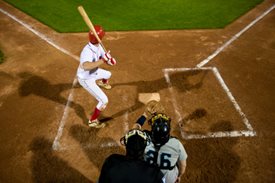Strike Three! Concussion Study Shows Slip in MLB Batting Performance
Major League Baseball players performed worse at the plate after returning to play following a concussion, compared to players who were rusty due to paternity or bereavement leave, a URMC study shows.
Led Jeffrey Bazarian, M.D., professor of Emergency Medicine at URMC, the research was published this week in the American Journal of Sports Medicine.
The study suggests that players may not be fully recovered despite following MLB policies of staying out of the game for a minimum of seven days. It’s possible the methods used to determine readiness to play (such as being symptom-free) do not accurately detect whether the brain can function well enough at the plate, Bazarian said. High-performance hitting requires visual acuity, balance and posture stability, hand-eye coordination, reaction time, and concentration. The research shows that brain function can be subtly impaired for weeks or months following a concussion, not days.
First author Erin Wasserman, an epidemiology doctoral candidate in the Department of Public Health Sciences specializing in concussion research, used publicly available MLB data to compare batting performance among 66 players recovering from a concussion versus 68 players who were away from the game for non-injury reasons.
In the two weeks following each group’s return, the numbers for concussed players versus paternity/bereavement leave players were: Batting average -- .235 vs .266; Slugging percentage -- .361 vs .423; On-base percentage -- .294 vs .326; and On-Base plus Slugging -- .650 vs .749.
Bazarian believes the study is unique. Only one other scientific article has looked at the relationship between concussions and a sport-specific performance such as batting, and that sport was football.
For the full study, click here.
To see a news article in the Washington Post, click here.

